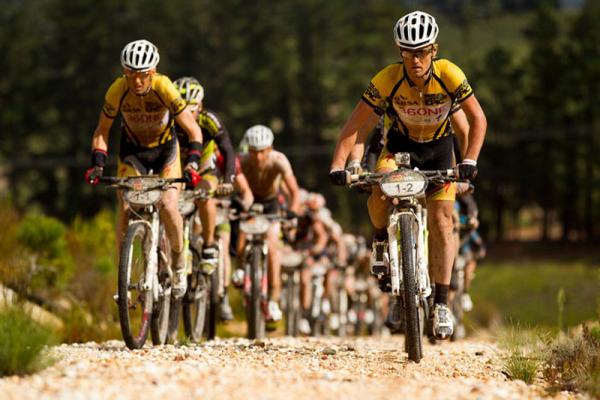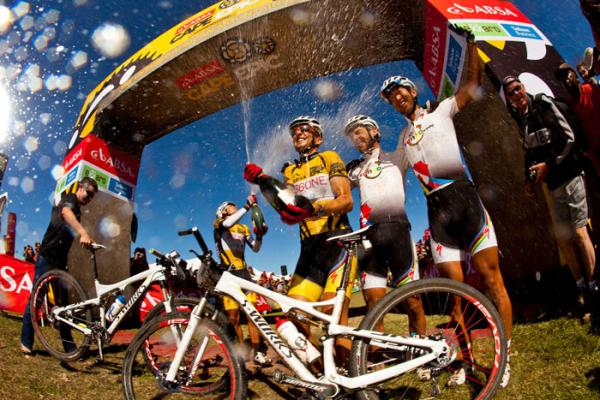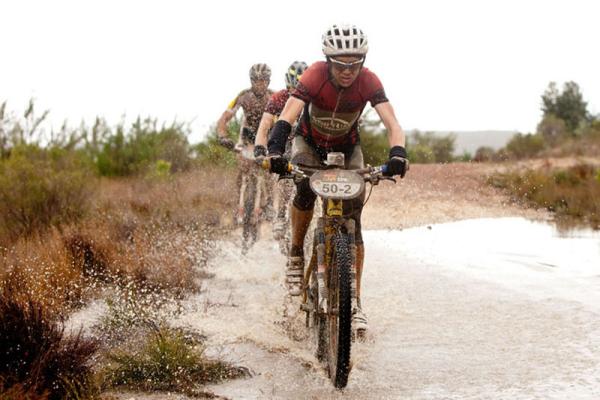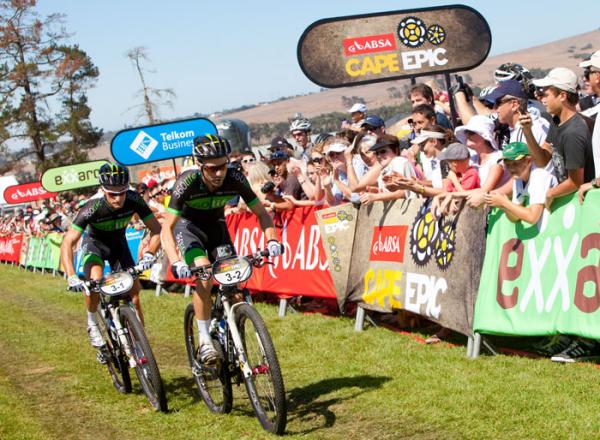Cape Epic mountain bike stage race presented for 2013
New route will take participants through unexplored territory in 2013




The new route of the 10th edition of the Absa Cape Epic, which will take place from March 17 to March 24, 2013, promises to be as exciting and challenging as previous years. Both local and international riders will take on the demanding eight-day mountain bike race over 698km with 15,650m of climbing from Citrusdal to Lourensford Wine Estate.
The route, which changes significantly each year, will lead 1,200 participating cyclists, world champions and dedicated amateurs, through vast distances of challenging terrain. With its unexplored landscapes, the stage locations of Citrusdal, Tulbagh, Wellington and Stellenbosch await the most prestigious mountain bike stage race in the world, before riders again finish at the Lourensford Wine Estate, as has been tradition since 2007.
One of the most visited tourist attractions in the southern hemisphere, the Victoria & Alfred (V&A) Waterfront, will again play host to the opening celebrations and registration for this pioneering, tough and breathtaking mountain bike race on March 15-16, 2013.
For the sixth time in the Cape Epic's history, riders will compete in a prologue. A common feature in road cycling Grand Tours, the prologue at Meerendal Wine Estate will allow spectators to see teams race against the clock. This showcase event will decide which teams will wear the coveted leaders' jerseys at the start of stage 1 on Monday, March 18, from Citrusdal.
"The Absa Cape Epic has again selected some of the finest terrain that the Western Cape has to offer," said Kevin Vermaak, Director and Founder of the Cape Epic. "Our route designers have managed the perfect balance between challenging terrain, exciting singletrack and scenic beauty in their quest for the ultimate mountain biking experience."
"We'd like to honour the effort that so many of the world's top riders make to ride the race, travelling from around the world to be here, with our increased prize purse of R1 million," said Vermaak. "Celebrating the iconic 10th edition of the race is testimony to how this event continues to grow from strength to strength. I'd like to thank our sponsors for their ongoing support in working with us to grow this event.
"We aim to offer all our participants from around the world a spectacular route which showcases the best the Western Cape has to offer. Every year we introduce new routes, with suitable technical and challenging riding, that take the riders to new towns and at the same time offer them magnificent scenery, with some of Africa's wild animals to boot. Without the incredible support of Cape Nature Conservation and the farmers, this would not be possible as they give us access to their reserves and farms. The Cape Epic is progressively becoming an iconic endurance event on the world calendar, and finishing this event is and will always be an enormous achievement. It is an immense physical and mental challenge, with riders spending many hours preparing and training for the title of 'Cape Epic Finisher'," said Vermaak.
Get The Leadout Newsletter
The latest race content, interviews, features, reviews and expert buying guides, direct to your inbox!
The 2012 edition of the Cape Epic was won by Burry Stander & Christoph Sauser and Sally Bigham & Esther Süss.
Prologue - Meerendal Wine Estate (23km, 700m climbing)
Following the resounding success of the 2012 prologue, the Cape Epic returns to Meerendal Wine Estate in Durbanville with a brand new prologue route in 2013. Set off with a bang, riders will leave the start chute riding through - yes, through! - the historic Meerendal Manor House and almost immediately thereafter face a challenging climb up "Stairway to Heaven" to the top of Dorstberg, a mountain top boasting magnificent 360-degree views of world famous landmarks such as Table Mountain, Robben Island and Cape Point.
Pressed for time, teams will have to forego sight-seeing as they dive straight into a rugged, Renosterveld lined trail that descends into the quarry and adjacent Hoogekraal farm, where sweeping singletrack forming part of the Tygerberg Mountain Bike Club trail system lies in wait. Well bermed turns make for a fun roller coaster descent as the route ultimately heads back through steep vineyards and a steady climb past dairy fields onto the picturesque Meerendal Wine Estate, finishing off with some more singletrack and ensuring riders finish the first day with big smiles on their faces.
Stage 1 - Citrusdal to Citrusdal (103km, 2,500m climbing)
Stage 1 is a 103km loop on virgin Cape Epic territory, starting and finishing in Citrusdal, a small farming town at the foot of the majestic Cederberg Mountain Range. The stage starts with a bang, climbing from the word go - up Piekenierskloof on relatively smooth roads. As the gradient flattens out, it will be the sandy surface slowing riders down as they scale the first major obstacle of the day.
From the top, riders are awarded with breathtaking vistas onto the Olifants River Valley some 600m below, and a fast, in places loose and rocky, 7km descent. Crossing the Olifants River will be a wet affair, before the climb out the valley on the other side - a steady 8km effort with 500m of elevation. The next few kilometres will become a blur until riders hit the 4km section of rugged dual track and a short, but thrilling singletrack descent. This will be followed by a gradual descent to water point 2, the farm roads being just uneven enough to keep participants focused, but at pleasant cruising speed past the citrus orchards. Riders need to fill up properly at this water point as the most challenging section of the day awaits. Over the next 7km, riders will have the illusion of having climbed out of the narrow hot valley, only to see another steep trail forcing portage up ahead of them. To reach it, riders need to put their downhill skills to the test on the narrow, rutted quad bike trail. This short and technical section is bound to take the back half of the field over an hour to complete.
The long descent to water point 3 is followed by approximately 20km through the farmlands in the Olifants River Valley. With no significant climbs worth mentioning, though by no means flat, riders will enjoy a slight reprieve before reaching the final obstacle of the day - a tough, sandy slog up the mountain side and just reward of a fast, fun descent into the race village in Citrusdal.
Stage 2 - Citrusdal to Saronsberg Wine Estate, Tulbagh (145km, 2,350m climbing)
Stage two will take riders deep into the Koue Bokkeveld, known for its spectacular sandstone formations. The area often gets snow in winter, but riders will only fantasize about that, with summer temperatures regularly in the upper 30s (degrees Celsius). Most of the work is done early in the day with riders putting mileage into their piggy banks when scaling Middelberg Pass, a relentless climb with 900m altitude gain over the first 18km, starting off on tar before turning into smooth gravel road. The descent onto the plateau is fast and exhilarating with no technical obstacles, but a few sharp bends to slow riders down. The route will traverse beautiful buckfields on rolling dual tracks and farm roads. Riders can make up some time until just before the half way mark, where a 4km climb takes them to the highest point of the entire race (approximately 1,150m above sea level). Shortly afterwards they will be rewarded with a 5km singletrack section, winding its way through red sandstone formations. Overall this stage feels fast and relatively flat, until riders hit the rugged and challenging wagon trail that takes them into the Witzenberg Valley. Cleared for the race by local farmers, who are keen mountain bikers themselves and happy to share their home playground, this part of the race will showcase some of the finest terrain the Western Cape has to offer.
The best is saved for last when riders finally get to cash in on that piggy bank - a technical 5km singletrack, an old wagon trail opened up for the 2010 Cape Epic, plummeting into the Tulbagh Valley. Stage two could almost be considered a ‘roadie' stage, although true roadies will be in for a wake up call when they hit the wagon trails. The stage offers a fantastic transition onto a new playground, from the rugged and remote Cederberg, to the fertile Tulbagh Valley with its quaint village and wine farms.
Stage 3 - Saronsberg Wine Estate to Saronsberg Wine Estate, Tulbagh (92km, 1,950m climbing)
Imposing mountain ranges, the Obiqua Mountains to the West, the Winterhoek Mountains to the North and the Witzenberg range to the East, surround the town of Tulbagh. The mountain basin enjoys equally attractive conditions for wine making and mountain biking, and both have seen advancements in recent years, with not only new vineyards, but also new trails springing up. What better combination than having the race village at the Saronsberg Wine Estate? Stage 3 offers a "tour of the basin", with a figure of 8 traversing the vineyards and farmlands, skirting the surrounding mountains. By now riders should be used to starting with a climb - 400m over 15km, with a short warm up, being rather gentle on the legs though. This is followed by 3km of sweeping singletrack, finishing off with a section through poplar forest. This moderate start is characteristic for what follows, a pleasant day, with lots of ups and downs interspersed with flowing singletrack sections.
However, it all becomes one big blur after the previous two days. What stands out is that the day is more gentle, the soil is softer, the vegetation more lush and the hills shorter. If through that blur riders happen to hear the finish line, smell the race village, but their speedometer only reads 55km, they need to keep pedaling. So close and yet so far from home, they are about to embark on the second part of the figure of 8. This loop is shorter, but includes the same amount of climbing as the first one, and just when everyone thinks ‘this wasn't too bad', Dr Evil and the route design team show their true face. After water point three comes the blow to the legs - a 1.5km climb on a steep farm road, followed by a short descent and 3 more short but sharp climbs on rough surface, before it is finally (almost) all downhill and back to the manicured fields of Saronsberg Wine Estate.
Stage 4 - Saronsberg Wine Estate, Tulbagh to Wellington (106km, 1 900m climbing)
Stage 4 is another transition day moving on to a new destination, characterised by three major climbs and extremely varied terrain. It is a stage of contrasts with smooth gravel, then very rugged, followed by the National Monument of Bains Kloof Pass on tar, then beautifully manicured purpose built singletrack.
The first 15km are "free mileage", spinning out the legs on flat gravel and also some tar road. The route then turns onto forestry roads gaining some elevation skirting the side of the mountain. Before riders know they will reach water point 1, but the next stretch will be slow going. A 5km steady climb up on gravel road with an average of 7% gradient awaits at Kluitjieskraal. On the other side, riders descend into a desolate bowl. Soon the trail roughens until it becomes an 8km bike-swallowing descent. The gradient is not steep but the track is washed out, rocky (and sandy) with many ruts and big holes lying in wait for the unwary rider. After water point 2 a flat minor gravel road leads to the foot of Bain's Kloof Pass. The climb on tar is 16km and not having to focus on any rugged surface, riders will be able take in the spectacular scenery of this National Monument Site.
On the other side the Cape Winelands open up, with views onto Wellington, Paarl Rock and as far as Table Mountain, some 70km away as the crow flies. Only the first bit of the descent is on tar, before riders plunge into the beautifully kept Bain's mountain bike trails at Welvanpas, smooth flowing ups and downs, perfectly carved into the mountain side. However, there is one more big climb, most of it on forestry roads, and it is the best value for climbing a mountain biker could ask for, earning themselves 4km downhill of handcrafted singletrack through fynbos vegetation. There is one more tiny bump, and then the last couple of kilometers are all plain sailing into the new race village in Wellington.
Stage 5 - Wellington to Wellington (75km, 1,800m climbing)
The fifth stage is like a bonus day - short, sweet, and most importantly, great fun! Riders will already have had a taste of the Bain's mountain bike trails at Welvanpas on the previous day - a fantastic purpose built network of singletrack, perched between the Wellington vineyards and the slopes of Bain's Kloof. The relatively short distance of 75km offers more singletrack than any previous Cape Epic stage, featuring some amazing cross country terrain, lots of twisting ups and downs - all in all an extra enjoyable day to re-energise body and mind. To avoid any congestion on the trails, the start groups will be staggered out over 1.5 hrs.
Stage 6 - Wellington to Stellenbosch (100km, 2,950m climbing)
With a maximum stage time of 10 hours, riders should prepare themselves for a long stage, the last real hurdle of the 2013 Cape Epic. The first 20km are primarily in the forestry plantation on the slopes of Du Toitskloof, as riders tackle a steady 10km climb followed by an equally long, fast descent interrupted occasionally by some soft forest singletrack as well as a short spike. The second major climb is primarily through orchards that soon give way to mountain fynbos as the trail turns more rugged, including another singletrack descent, but riders need to watch out for the handle bar grabbing fynbos. By the time riders cross under the National Highway (N1) at the 35km mark, they will have completed almost half the climbing of the day.
The next section is fast going, and riders clock up some easy mileage as the route takes them alongside the Drakenstein Mountains on a mix of farm and gravel roads in the direction of Franschhoek. The highlight being when riders past "Freedom Hill", the hill that former President Nelson Mandela looked out at from his prison house at Victor Verster Prison (now Drakenstein Correctional Facility) where he spent the last three of his 27-year imprisonment before being released on 11 February 1990. Once the route makes the turn towards Helshoogte Pass it's slow going, as the trail hugs the steep slopes of the iconic Simonsberg Mountain. As riders crest the pass, views onto Stellenbosch, the second oldest town in South Africa, and its surrounding winelands open up, but it is still quite a way to the race village, passing through prestigious wine farms and the hidden Idas Valley. True ‘tunnel vision' will set in as riders go underneath the R310. From here it is one last steep climb, before a sweeping descent sweetened by some more forestry singletrack which takes riders into race village for a one night stand, before the final stage looms.
Stage 7 - Stellenbosch to Lourensford Wine Estate (54km, 1,500m climbing)
The final stage of the 2013 Cape Epic is short, with only one major climb at the halfway mark. Riders will leave Stellenbosch along the mountainside through Coetzenberg and Eden Forest, then work their way into the Stellenbosch Winelands. The trail climbs up through the vineyards, opening up spectacular views of False Bay, as far as Cape Point, and back to Table Mountain and Durbanville, where the journey started 7 long days ago. Having mastered the 9km climb up the side of the Helderberg Mountain into the Lourensford Neck, the finish line is almost within sight as the view into the striking Lourensford bowl opens up.
This is the first time in Cape Epic history that riders approach Lourensford Wine Estate from a totally different direction and not via Gamtouw Pass. The final 25km are predominantly downhill, on forestry roads on the higher elevations, interspersed with some singletrack, and into the orchards and vineyards on the lower slopes. The final run onto the lush green polo field packed with grandstands, marquees and supporters promises to be unforgettable.
Visit www.cape-epic.com for more information.